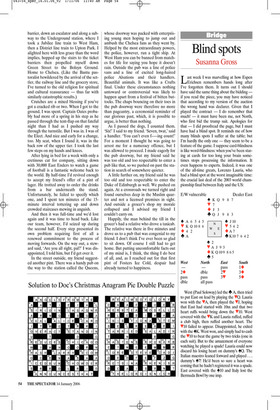Bridge
Blind spots
Susanna Gross
Last week I was marvelling at how Espen Erichsen remembers hands long after I’ve forgotten them. It turns out I should have said the same thing about the bidding if you read the piece, you may have noticed that according to my version of the auction the wrong hand was declarer. Given that I played the contract — I do remember that much! — it must have been me, not North, who first bid the trump suit. Apologies for that — I did proofread the page, but I must have had a blind spot. It reminds me of how many blinds spots I suffer at the table; but I’m hardly the only one — they seem to be a feature of the game. I suppose card-blindness is like word-blindness: when you’ve been staring at cards for too long your brain sometimes stops processing the information. It even happens to experts. Indeed, it was one of the all-time greats, Lorenzo Lauria, who had a blind spot at the worst imaginable time: the crucial last deal of the 2003 world championship final between Italy and the US: West (Paul Soloway) led the ♣ A, then tried to put East on lead by playing the ♥Q. Lauria won with the ♥A, then played the ♥J, hoping that East had started with 10xx and that two heart ruffs would bring down the ♥10. West covered with the ♥K and Lauria ruffed, ruffed a club high, then ruffed another heart. The ♥10 failed to appear. Disappointed, he exited with the ♠K. West won, and simply had to cash the ♥10 to beat the game by two tricks (one in each suit). But to the amazement of everyone watching he played a spade! Lauria could now discard his losing heart on dummy’s ♠Q. The Italian maestro leaned forward and played . . . dummy’s ♠7! He’d been so sure a heart was coming that he hadn’t registered it was a spade. East covered with the ♠10 and Italy lost the Bermuda Bowl by one imp.














































 Previous page
Previous page